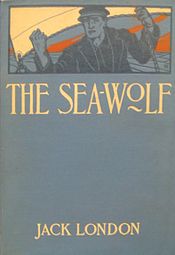Much of Jack London’s writing prompts me to think about the differences between animals and humans. None of his characters have made me think about this so much as Wolf Larsen in London’s novel, The Sea Wolf.

Larsen is the Captain of a seal-hunting schooner called the Ghost. Reminiscent of Rudyard Kipling’s novel Captains Courageous, The Sea Wolf tells the tale of Humphrey Van Weyden, a learned man of privilege who is abandoned by his luxury liner and picked up (and saved) by Wolf Larsen’s ship. As with Kipling’s novel, Van Weyden learns “the ropes” of seafaring, something he never dreamed of doing.
The Sea Wolf, however, puts much more depth and complexity into this story and into the relationship between Larsen and Van Weyden. Wolf Larsen is created with varied contradictions that form a realistic if somewhat scary and perhaps even tragic man. While he rules the ship the way a lion (or perhaps a wolf) would rule the jungle, he has the seemingly educated mind of a philosopher. He becomes attached to Van Weyden because he can have conversations with him about literature and philosophy. However, he fundamentally disagrees with Van Weyden about what makes a human. Van Weyden implies that his world view is one where humans have a moral code, an ability to think, and a soul. Larsen understands his ability to think as a human; however, he looks at it as a curse instead of a blessing. He almost would rather be an animal that doesn’t have to think or worry about morals or his soul. He tells Van Weyden this in one of their confrontations:
You have called me snake, tiger, shark, monster, and Caliban. And yet, you little rag puppet, you little echoing mechanism, you are unable to kill me as you would a snake or a shark, because I have hands, feet, and a body shaped something like yours.
London’s ability to display both the fondness and the disdain Larsen has for Van Weyden is truly amazing.
While Larsen is certainly the more compelling character of the novel, Humphrey Van Weyden gives him a run for his money in a more subtle way. As the reader, while I was in awe of Wolf Larsen as an intellectual monster, “oppressed by the primal melancholy of his race”, Van Weyden quietly seemed to grow on me.
He acknowledged the influence that Larsen had on him:
While my faith and hope in human life still survived Wolf Larsen’s destructive criticism, he had nevertheless been a cause of change in minor matters. He had opened up for me the world of the real, of which I had known practically nothing and from which I had always shrunk.
Van Weyden also managed to “find his legs” to stand on during his conversations with Larsen:
You will observe there… a slight trembling. It is because I am afraid, the flesh is afraid; and I am afraid in my mind because I do not wish to die. But my spirit masters the trembling flesh and the qualms of the mind. I am more than brave. I am courageous. Your flesh is not afraid. You are not afraid. On the one hand, it costs you nothing to encounter danger; on the other hand, it even gives you delight. You enjoy it. You may be unafraid, Mr. Larsen, but you must grant that the bravery is mine.
Van Weyden’s ability to adapt to his surroundings and his circumstances made him something more than simply a self-proclaimed man of ideas. His intellect crossed over from the world of thinking to the world of doing when “doing” was required to survive. Perhaps this is bravery?



